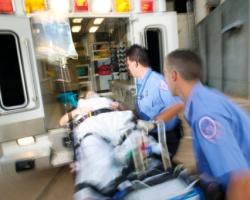Boston Bombing Brought out the Best in Some
Get downloadable PDF.
Get downloadable PowerPoint presentation.
About/Disclaimer
What Happened:
Boston was rocked April 15 when a bomb exploded near the finish line of the city’s historic marathon. Three people died in the blast. More than 100 were injured, many seriously.
It was a terrifying, tragic event. Blood covered the streets, and a scene of horrible carnage was everywhere. Yet many bystanders reported that soon after the blast people ran toward the disaster—not away from it.
Bystanders performed basic first aid when and where they could—caring for the injured and calming the scared. Runners, as they finished the 26-mile run, sprinted past the finish line and literally ran to local hospitals in order to donate blood. Some Twitter followers of former New England Patriot Joe Andruzzi were worried that he might’ve been hurt in the blast when his Twitter feed went silent for hours, but he was simply busy helping the rescue effort.
Others not in the immediate vicinity helped however they could, in big ways and small. Area restaurants offered free meals to those impacted by the blast. Bostonians opened their homes to visitors who were without shelter when many hotels were forced into lockdown. Donations poured in across the country.
New York, often a big-city rival of Boston’s, offered its own special tribute. The New York Yankees played Neil Diamond’s “Sweet Caroline” during the seventh inning stretch at Yankees Stadium—a longstanding tradition for the Boston Red Sox at Fenway Park—and New York projected a message to Boston at the Brooklyn Academy of Music: “Darkness cannot drive out darkness, only light can do that.”
Across Facebook and Twitter, a quote from the late Mr. Rogers went viral: “When I was a boy and I would see scary things in the news, my mother would say to me, ‘Look for the helpers. You will always find people who are helping.'”
Talk About It:
Look for the helpers. That’s what Christians always should be in good times and bad. You don’t need to be Christian to help, of course. In Boston, surely people pitched in from a multitude of faiths; but as Christians, we’re called to be light in dark places. We’re called to be the hands and feet of God.
You don’t need to be in the midst of a crisis to help, of course. Have you been able to give help to someone? How? Do you help out regularly by sponsoring a child or helping at a charity? How have you helped for family? Your friends?
What does your church do to help? Do you know where your church’s tithes and offerings go? Are they active in your community? Do they send out missionaries? Do they reach out to the world?
Does your youth group do special things to help? What does it do? Are there more things your friends or your leaders would like to do?
What the Bible Says:
“You, my brothers, were called to be free. But do not use your freedom to indulge the sinful nature; rather, serve one another in love. The entire law is summed up in a single command: ‘Love your neighbor as yourself'” (
“For I was thirsty and you gave Me something to eat, I was thirsty and you gave Me something to drink, I was a stranger and you invited Me in, I needed clothes and you clothed Me, I was sick and you looked after Me, I was in prison and you came to visit Me…I tell you the truth whatever you did for one of the least of these brothers of Mine, you did for Me” (
“Let us not become weary in doing good, for at the proper time we will reap a harvest if we do not give up” (
“In the same way, let your light shine before others, that they may see your good deeds and glorify your Father in heaven” (
Paul Asay has covered religion for The Washington Post, Christianity Today, Beliefnet.com and The (Colorado Springs) Gazette. He writes about culture for Plugged In and wrote the Batman book God on the Streets of Gotham (Tyndale). He lives in Colorado Springs with wife, Wendy, and two children. Follow him on Twitter.




